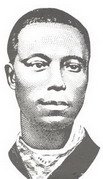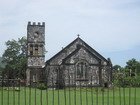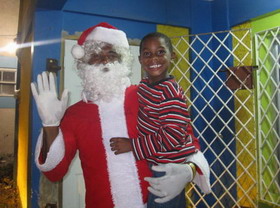Paul Bogle
and the Morant Bay Rebellion

A man like Paul Bogle had no need to disturb the peace. He was a successful small farmer. He owned enough land to entitle him to a vote, which couldn't be said of most blacks in the 1860's. He was a respected Deacon in his village church. He could have been content to just live his life.
But he was a man who thought about more than just himself.
In 1865, the black population of Jamaica had almost nothing to show for their almost 30 years of emancipation from slavery.
The majority had no land or work. Wages were dismally low. Drought and flood had severely affected the small provision grounds that some managed to cultivate. Imported goods were unaffordable, prices having been drastically inflated as a result of the American Civil War.
People were starving, and without hope.
Despite emancipation, the planter class retained authority over government and adminstration of justice, which they meted out in a draconian fashion. Any incident of trespass, squatting or minor wrongs resulted in severe punishment or penalties.
In the parish of St. Thomas-in-the-east, Paul Bogle was an ex-slave who had become a successful small farmer and landowner. The ownership of land gave him the right to vote, a right held by only 106 persons in the parish. He was connected both religiously and politically to George William Gordon, a mixed race Jamaican businessman and landowner who was a harsh critic of the island's governor, and an advocate for the rights of black Jamaicans.
Gordon established Native Baptist chapels in Kingston and St. Thomas, and ordained Paul Bogle as a deacon in the church. Bogle in turn established his own chapel in his village, Stony Gut, in the hills of St. Thomas. The support of Bogle and his group of Native Baptists was pivotal in George William Gordon being elected to represent St.Thomas on the National Assembly.
In addition to its religious functions, Bogle's chapel became a centre for political activity and, some believe, military training. Bogle began to organise demonstrations against injustices in the legal system.
Paul Bogle marches
In August of 1865, Paul Bogle and some of his followers marched over 50 miles from Stony Gut to Spanish Town, the capital of Jamaica at that time. Governor Eyre refused to meet with them. The protesters headed back to Stony Gut, and began to plan their own court system, appointing magistrates and other officials. Hearing of these plans, the police had two of Bogle's men arrested on spurious charges.
On October 7, Bogle and a group of his supporters marched to the Morant Bay courthouse, where the two men were being tried. They surrounded the courthouse and attempted to disrupt the proceedings with a loud, but peaceful protest. A skirmish with the police ensued, providing just the excuse the authorities needed to issue a warrant for Paul Bogle's arrest.
On October 10, the police tried to arrest Bogle at Stony Gut. The villagers prevented the arrest from taking place. The police fled back to Morant Bay bearing the news that Bogle's group planned to march on the town the next day. The Custos (the governor's representative in the parish) called out the Volunteer Militia and requested additional military assistance from the governor.
On October 11, Bogle and about 400 supporters marched into Morant Bay. They raided the police station for arms, and attacked the courthouse where the local council was having a meeting. The ensuing violence left the Custos and 17 other officials and soldiers dead, along with 7 of Bogle's supporters.
Troops sent by the governor arrived the next day. Black soldiers of the First West India Regiment, under white officers, arrived by ship. Then white soldiers from Newcastle in St. Andrew arrived on foot. Even some Maroons, to the disgust of the black population, joined in the vicious fight against Paul Bogle's men.
As the protests spread violently through St. Thomas, the authorities feared that they would soon affect the whole island. Martial Law was declared on October 13, pretty much giving the army freedom to do whatever they liked. The rebellion and protesters were brutally crushed.
Paul Bogle escaped to the hills.
Governor Eyre used the uprising as an opportunity to eliminate his chief political critic, George William Gordon. Gordon, who had been in Kingston during all the events leading up the rebellion, was arrested and charged with treason and complicity with the protesters. He was sentenced to death and hanged on October 23.
Bogle was caught, and hanged in front of the courthouse on October 25.
In the weeks that followed, over 430 men and women were killed by soldiers or executed by court martial. Another 600 men and women were flogged, and over 1000 homes and farms were burnt to the ground.
People with the name Bogle, and others with names associated with the rebellion, were forced to change their names in order to avoid persecution by the authorities, and resentment from fellow citizens who blamed them for the troubles experienced by the parish. For many years the name Bogle was hated by many.
The ferocious crushing of the Morant Bay Rebellion served to focus British attention on the atrocious social conditions in Jamaica. Governor Eyre was recalled to England. The Local Assembly, which had been Jamaica's independent law-making body, surrendered its authority to the Crown. The island was placed under direct rule from Britain, known as Crown Colony government. Measures were taken improve the conditions on the island, and the new governor was charged to represent the interests of all citizens.
It was only after independence in 1962, along with the perspective allowed by the passage of time, that the contribution of Paul Bogle to the development of independent Jamaica was fully recognised.
When the Order of National Hero was established in 1969, The Right Excellent Paul Bogle was one of the five individuals named as National Heroes of Jamaica. A well deserved honour.
Return from Paul Bogle to Real Jamaica Vacations
Other Great Pages
History of Jamaica
Christmas in Jamaica
Jamaican Animals
Jamaica People
Jamaican Climate
Explore Jamaican Language
Latest talk on the streets - da page ya sell off, memba mi tell yu!
Words in everyday use - macca, foot bottom, ginnal
Unique phrases that are extremely expressive - pop story gi mi!
Sayings that have lived for generations - play wid puppy...









